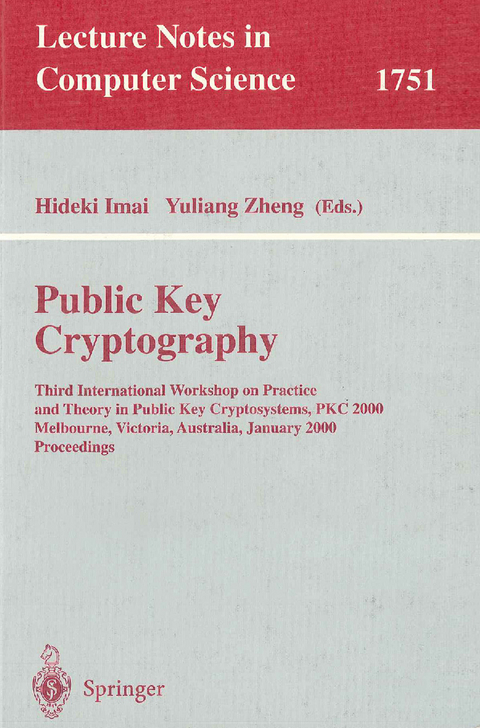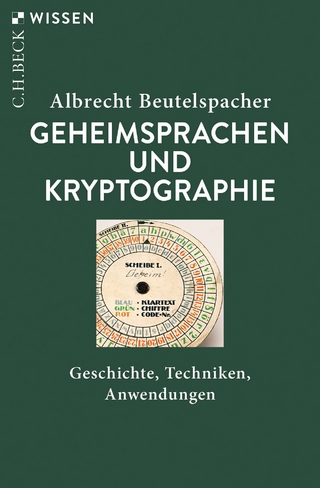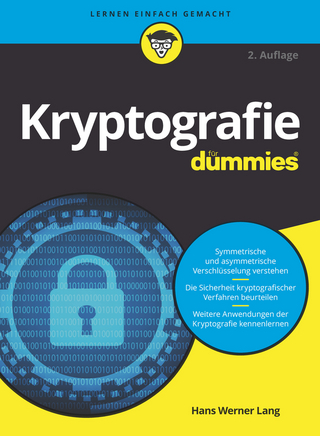
Public Key Cryptography
Springer Berlin (Verlag)
978-3-540-66967-8 (ISBN)
ThePKC2000conferencewasheldattheMelbourneExhibitionCentre,Victoria, Australia, January 18-20, 2000. It was the third conference in the international workshop series dedicated to practice and theory in public key cryptography. The program committee of the conference received 70 full submissions from around the world, of which 31 were selected for presentation. All submissions were reviewed by experts in the relevant areas. The program committee consisted of 19 experts in cryptography and data se- rity drawn from the international research community, these being Chin-Chen Chang (National Chung Cheng University, Taiwan), Claude Cr epeau (McGill University, Canada), Ed Dawson (Queensland University of Technology, A- tralia), Yvo Desmedt (Florida State University, USA), Hideki Imai (Co-chair, UniversityofTokyo,Japan),MarkusJakobsson(BellLabs,USA),KwangjoKim (Information and Communications University, Korea), Arjen Lenstra (Citibank, USA),TsutomuMatsumoto(YokohamaNationalUniversity,Japan),DavidN- cache (Gemplus, France), Eiji Okamoto (University of Wisconsin-Milwaukee, USA),TatsuakiOkamoto(NTTLabs,Japan),JosefPieprzyk(UniversityofW- longong, Australia), Jean-Jacques Quisquater (Universit e Catholique de L- vain, Belgium), Nigel Smart (HP Labs Bristol, UK), Vijay Varadharajan (U- versity of Western Sydney, Australia), Serge Vaudenay (Ecole Polytechnique F ed erale de Lausanne, Switzerland), Moti Yung (CertCo, USA), and Yuliang Zheng (Co-chair, Monash University, Australia). Members of the committee spent numerous hours in reviewing the submissions and providing advice and comments on the selection of papers.
A Practical and Secure Fault-Tolerant Conference-Key Agreement Protocol.- An Efficient NICE-Schnorr-Type Signature Scheme.- Identification of Bad Signatures in Batches.- Some Remarks on a Fair Exchange Protocol.- Gaudry's Variant against C ab Curves.- An Identification Scheme Based on Sparse Polynomials.- A State-Based Model for Certificate Management Systems.- Confidence Valuation in a Public-Key Infrastructure Based on Uncertain Evidence.- The Composite Discrete Logarithm and Secure Authentication.- Chosen-Ciphertext Security for Any One-Way Cryptosystem.- Short Proofs of Knowledge for Factoring.- Secure and Practical Tree-Structure Signature Schemes Based on Discrete Logarithms.- All-or-Nothing Transform and Remotely Keyed Encryption Protocols.- Security of Public Key Certificate Based Authentication Protocols.- Efficient Implementation of Schoof's Algorithm in Case of Characteristic 2.- Key Recovery in Third Generation Wireless Communication Systems.- Elliptic Curves with the Montgomery-Form and Their Cryptographic Applications.- Certificates of Recoverability with Scalable Recovery Agent Security.- Design Validations for Discrete Logarithm Based Signature Schemes.- Optimally Efficient Accountable Time-Stamping.- "Pseudorandom Intermixing": A Tool for Shared Cryptography.- RSA-Based Auto-recoverable Cryptosystems.- Efficient and Fresh Certification.- Efficient Zero-Knowledge Proofs of Knowledge without Intractability Assumptions.- Cryptographic Approaches to Privacy in Forensic DNA Databases.- Making Hash Functions from Block Ciphers Secure and Efficient by Using Convolutional Codes.- Fast Implementation of Elliptic Curve Arithmetic in GF(p n ).- An Auction Protocol Which Hides Bids of Losers.- Forward Secrecy and Its Application to Future MobileCommunications Security.- Selecting Cryptographic Key Sizes.- A Structured ElGamal-Type Multisignature Scheme.
| Erscheint lt. Verlag | 5.1.2000 |
|---|---|
| Reihe/Serie | Lecture Notes in Computer Science |
| Zusatzinfo | XIV, 490 p. |
| Verlagsort | Berlin |
| Sprache | englisch |
| Maße | 155 x 235 mm |
| Gewicht | 656 g |
| Themenwelt | Informatik ► Theorie / Studium ► Kryptologie |
| Schlagworte | Algorithm analysis and problem complexity • authentication • cryptographic protocols • cryptography • Digital Signatures • Elliptic Curve Cryptography • Kryptographie / Kryptologie • Public Key Cryptography • Public Key Cryptosystems • security • Shared Cryptography |
| ISBN-10 | 3-540-66967-1 / 3540669671 |
| ISBN-13 | 978-3-540-66967-8 / 9783540669678 |
| Zustand | Neuware |
| Haben Sie eine Frage zum Produkt? |
aus dem Bereich


